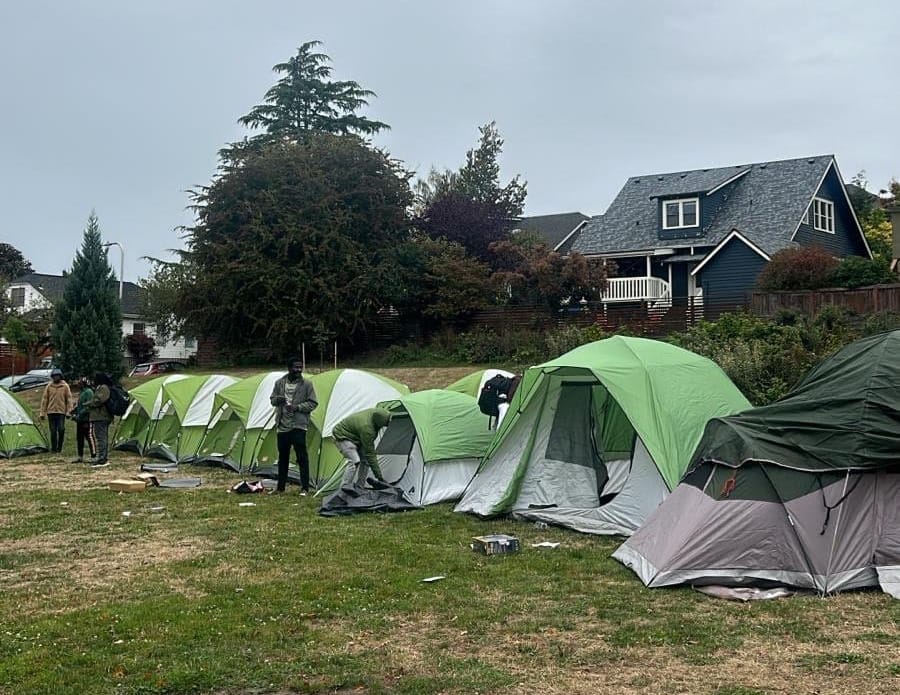Asylum seekers left to fend for themselves after chaotic closure of Kent encampment

Update: the asylum seekers were swept from Powell Barnett Park by the city of Seattle this morning at 7 a.m. They are still trying to figure out what to do next.
About 50 asylum seekers, facing few options for shelter, camped overnight on Oct. 1 at Powell Barnett Park in Seattle’s Central District. Residents of the newly formed camp were displaced from another encampment on the grounds of the EconoLodge in Kent, a property owned by King County. This is the third time asylum seekers have camped at the Central District since April.
The Kent encampment was closed suddenly on the morning of Sept. 24 with no prior notice. A member of South King County and Eastside Mutual Aid said the closure was done in a chaotic manner, leaving residents to scramble to salvage their belongings.
More than 200 people had been sheltering at the encampment at the time. Most come from Venezuela, Angola and the Democratic Republic of the Congo, fleeing war and violence. The U.S. has intervened in or exacerbated many of those conflicts.
The Kent encampment was formed in June and had already experienced one attempted closure in early July, which resulted in about 170 residents receiving housing from the Low Income Housing Institute (LIHI). Not everyone was able to get housing, resulting in the camp staying in place. As a result, King County posted 24-hour security guards, installed a fence and imposed restrictions on the growth of the encampment.
The abrupt closure resulted in a scattering of camp residents. According to King County, 31 families with children were offered two month stays in a hotel shelter in Tacoma, run by the nonprofit Thrive International, a contractor of King County. Approximately 75 adults without children were provided a five day stay at a hotel in SeaTac, which was later extended by an additional two days. In total, the county says that 192 people were provided shelter.
However, anyone who was not present on the morning of Sept. 24 was not offered shelter. According to the mutual aid organizer, 29 camp residents were left behind, many of whom were commuting to work, school, doctor appointments or other obligations. One family with young kids and two pregnant women — one of whom was in the middle of childbirth — were among the “left behinds” who did not receive housing from the county. The mutual aid organizer said that many of those asylum seekers lost valuable personal property, including passports and other legal documents.
The camp closure was carried out over the course of a few hours on the morning of Sept. 24. While residents were allowed to take their personal belongings and clothes, the mutual aid organizer claims King County did not allow them to take their camping gear and other supplies with them. The mutual aid organizer estimates that county staff destroyed or threw away about $20,000 worth of tents and other supplies, much of which was donated to the asylum seekers by community members.
In response to the closure, mutual aid organizers held an emergency fundraiser, raising about $3,000 to temporarily house the left behind asylum seekers. Another $2,000 was raised to support the mother and her newborn.
On Oct. 1, the hotel stay for adults in SeaTac expired. According to a second mutual aid organizer, women and couples were offered shelter by King County. The single men, who did not receive any offers of shelter, joined up with the “left behinds” to camp at Powell Barnett Park.
Amy Enbysk, a spokesperson for King County Executive Dow Constantine, wrote in an email that the closure was carried out swiftly to “avoid exceeding available housing resources.” She contrasted the approach to the multi-day outreach done by LIHI in July, which resulted in new people showing after the intake process was started, forcing the organization to leave folks behind.
Enbysk wrote that King County was “not aware of documents or critical personal items being left behind” and that staff and outreach workers “would not knowingly dispose of important documents.” Enbysk added that although there was no limit to the amount of belongings asylum seekers could bring with them to the hotels, certain items like grills and generators could not be kept in the new housing. She said many items were left behind voluntarily to be discarded or donated.
Due to a lack of resources, Enbysk said not all asylum seekers could be offered long-term housing. The county prioritized housing for families with young children, elders and those with serious health conditions. In addition, the city of Seattle has pledged to house 30 more asylum seekers temporarily with funding from the state.
The ongoing lack of accommodations for asylum seekers is part of a wider housing crisis throughout the region. In the 2024 Point-in-Time Count, the King County Regional Homelessness Authority found that 16,000 people are currently homeless, including almost 10,000 people who are living without formal shelter.
In 2024, the Washington Legislature authorized $32.75 million in new funding for asylum seekers, immigrants and refugees. Most of the $5 million which was allocated to King County has been awarded to Thrive International and LIHI. However, the state’s $16.4 million “Washington Migrant and Asylum-Seeker Support Pilot Project” — which was supposed to launch in September — has not yet materialized.
Many of the asylum seekers camping right now in Powell Barnett Park have been displaced multiple times. Adult men have expressed frustration that state and local governments have repeatedly passed over them for people at higher risk. Some say they feel “tricked” by the county, which did not have adequate translation services at the Sept. 24 closure. Due to the chaotic nature of the situation, accounts from asylum seekers, mutual aid organizers and the county may be contradictory.
The migrant dignity coalition, which includes groups organized by asylum seekers as well as allies like South King County and Eastside Mutual Aid, is collecting donations and supplies for the people staying at Powell Barnett Park.

Member discussion